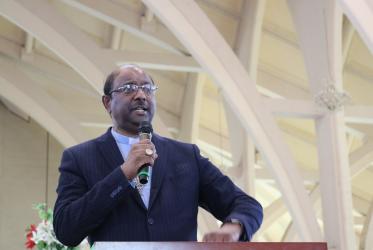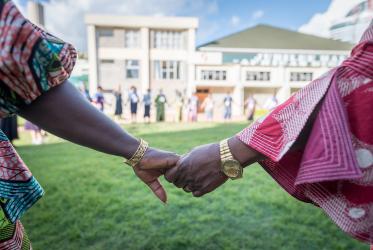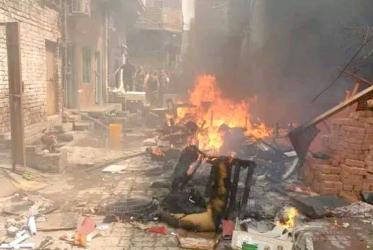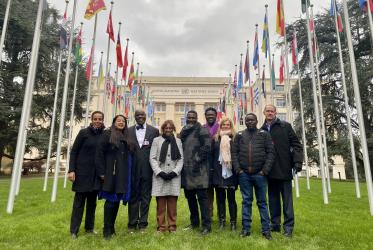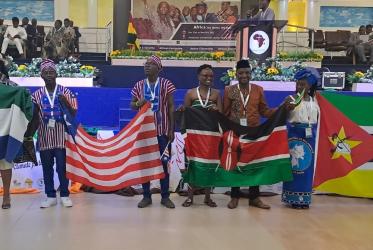H.E. Ban Ki-moon
Secretary General
United Nations
H.E. Levy Mwanawasa
Chair, SADC
H.E. Jakaya Kikwete
Chair, African Union
Geneva, 24 June 2008
A Joint Letter from the
World Council of Churches and the World Student Christian Federation
Excellencies,
We welcome the statement of 23 June by UN Secretary General, Ban Ki-moon, and the preliminary action taken by the UN Security Council on Zimbabwe; we also welcome the statement of 23 June by the Chair of SADC, H.E. Levy Mwanawasa.
It is now with profound concern that we call on you to increase your efforts to address the rapidly deteriorating situation in Zimbabwe. As church leaders representing more than 550 million Christians around the world, including members of many churches in Zimbabwe, we request that you direct urgent attention to the humanitarian needs of the people of Zimbabwe, their freedom to exercise religion, the destabilization of the political situation and the need to end human rights abuses .
Reports from those in and outside Zimbabwe persuade us that international intervention is now needed to distribute much-needed food aid. The government's decision to end food distribution by international agencies has led only to political isolation and increased suffering. Food and medicine are in particular demand, with the imminent threat of starvation in some areas. Education has also been disrupted, with some schools now housing government troops.
We have learned from our Zimbabwean brothers and sisters that some churches have been kept from offering worship while other church services have been violently dispersed. This situation, which is underreported in the media, is unacceptable and must receive urgent attention from the world community.
The much more publicized disintegration of the political situation can no longer be overlooked by the world.
We are concerned that Zimbabweans have been denied the right to choose their own leader in a free and fair election. The sovereignty of the people has been violated and must be restored.
The party that has created this violent situation on the ground now seems poised to be awarded the presidency, and with it the power to appoint additional senators who will sway the balance of parliament. Such a manipulation of the election process can have no legitimacy in the eyes of Zimbabweans or of the world. This precedent must not be set as the norm.
Charges have been made that serious crimes are being committed. These allegations must be investigated; if found to be substantial, alleged perpetrators must stand trial. The current election cycle has been reduced to a shambles. If the perpetrators of violence are not brought to account, attempts at a political solution will be fundamentally undermined. There can be no impunity.
The international community must insist on a political solution to the question of leadership in Zimbabwe. This may involve a postponement of the election, giving the time for the establishment of control mechanisms based on internationally accepted standards that would guarantee the unhindered expression of will of the people of Zimbabwe through truly free and fair elections. It is essential that the international community reaffirm the integrity of democratic elections as the means by which Zimbabwean citizens choose their leaders.
National governments clearly have the primary and sovereign responsibility to provide for the safety and well-being of their people. However, when there is egregious failure to carry out that responsibility, whether by neglect, lack of capacity, or direct assaults on the population, the international community has the duty to assist peoples and states, and in extreme situations, to intervene in the internal affairs of a state in the interests and safety of the people. When the State can no longer provide protection to its own people, the principle of non-intervention (art. 2.7 of the UN Charter) yields to the responsibility of the international community to protect them. This is the responsibility to protect (R2P).
At one time, Zimbabwe stood as the breadbasket of Africa. Its strengthening economy and growing freedoms served as a beacon of hope to all Africans who pursued the promise of a new Africa. Today Zimbabwe represents only suffering and hardship.
The people of Zimbabwe deserve better, and we as church leaders pray that the deep faith and perseverance of a proud people will once again emerge and be put in the service of rebuilding this society that is so tragically ravaged by distrust, dissension and violence.
The biblical prophet Amos proclaimed the coming of a day when "justice" would "roll down like waters, and righteousness like an ever-flowing stream" (Amos 5:24). Our prayer is for the speedy arrival of that day in Zimbabwe, and our hope is that the international community will accept this prophecy as a vision and a goal.
In peace,
|
Rev. Dr Samuel Kobia |
Rev. Michael Wallace |
|---|
CC:
H.E. President Thabo Mbeki, Republic of South Africa
Rev. Dr Mvume Dandala, General Secretary, All Africa Conference of Churches
Mr Eddie Makue, Chair, FOCCISA

